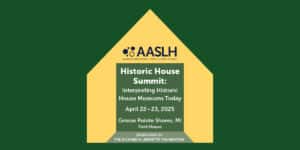By Bethany L. Hawkins
On April 22-23, 2025, AASLH held a summit at the Ford Estate in Grosse Pointe Shores, MI, for historic house museums focused on the topic of interpretation. In particular, attendees examined the current state of historic house interpretation and identified themes for the next generation of interpreters.
The attendees and facilitators identified the following themes from the programming and discussion at the April summit. They are challenging and will not be done in a day, week, or year. They are big picture trends designed to improve dialogue with visitors and empower interpreters and curators to challenge their audience resulting in a stronger connection to past and more empathy for the present.
The themes are:
- Define your values and non-negotiables – History is messy and polarizing. Historic house museums must define their values and non-negotiables to avoid losing their purpose in the current political climate. The non-negotiables will provide the foundation of their interpretation.
- Be bold – Be willing to throw out your old interpretation and start over. Break the habit of managing to the exception or giving the loudest voice priority. One attendee summed up the discussion with the challenge to “Do it, scared.”
- People are messy and complicated – More than most historical museums, historic house museums deal with real people. The individuals we interpret are messy and complicated. Interpretation should acknowledge the paradox that a person can be more than one thing at the same time. They can be enslavers and signers of the Declaration of Independence, and historic house museums should tell both sides of the story.
- Develop safe spaces for difficult conversations and places for visitors to opt out – Because historic house museums interpret a home and family, the topics we interpret can be uncomfortable and unsettling. We need to develop safe spaces for difficult conversations and places for visitors to opt out if the topic is too much (i.e. child loss). We also need to support our staff who are researching and delivering this content.
- Telling the “whole history” of our sites is more important than ever. We must commit in our non-negotiables to be inclusive in the stories we tell.
- Connect your audience to meaningful things relevant to their everyday life – Make connections for the audience by interpreting things relevant to their everyday life, but meaningful. Not the dishwasher or reproduction (or original) wallpaper, but topics that elicit emotion: sexuality, love, mental illness, grief—the things that make up a life.
- Do you have the artifacts and places to tell this story well? – What is your staging for your interpretation? Do you have the artifacts and primary sources for the thesis you want to interpret? Interpretation must be connected to the place or artifact or it is a tour that could have been given in the parking lot or on Zoom.
- Staff need training to deliver more meaningful content – Staff development, especially in facilitation and dialogic tours, lacks resources. The field needs tools from AASLH to train their staff, hopefully resulting in higher retention rate for employers.
What comes next?
AASLH’s Historic House Committee is working to amplify the findings from the seminar in several ways.
- On August 26, 2025, at 3 pm eastern, the Historic House Committee will host AASLH’s History Hour. This will include time for you to share what you think about the summit’s findings.
- At the 2025 AASLH/OLHA Annual Conference, there will be a working group to discuss the next steps for this information. What do these themes mean for the field moving forward? This conversation will continue until the 2026 AASLH/NCPH Joint Conference in Providence, RI.
- The AASLH staff are working on additional Professional Development opportunities related to the summit. This includes webinars and, possibly, a new “Historic House Pro” certificate program.
- Other resources will be developed for History News and other publications.
We hope you will join us on the journey to make historic house museums more relevant and meaningful for their staff, stakeholders, and visitors.
Thank you to the moderator and facilitators for the workshop who helped synthesize the two days of deep conversation into a plan: Michelle Moon, Andrea Jones, Richard Josey, Ahmad Ward, Susan Ferentinos, Rena Lawrence, Ann Loshaw, and Ryan Spencer.




